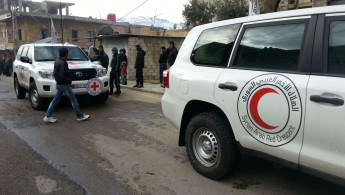Aid reaches Syrian town cut off by fighting
Al-Mleiha, a rural town near Damascus, where thousands of residents have been suffering dire conditions without clean water or fuel, received a Syrian Arab Red Crescent (SARC) convoy on Sunday, said the UN.
"People were asking for extra plastic sheeting and blankets as they don't have any other means for heating their homes, many homes have been destroyed, with many families sharing residences with relatives and neighbours," said a volunteer involved in the delivery.
The convoy provided 1,300 people living in the buffer zone around al-Mleiha with hygiene kits, plastic sheeting, sleeping mats, kitchen sets, blankets, and food parcels provided by the International Committee of the Red Cross.
Desperate families have reportedly been burning plastic to keep warm in the town that lies on a strategic road leading to Damascus airport.
Al-Mleiha had a population of 50,000 before the fighting started, but this has now dropped to 26,000, including 10,000 who have been internally displaced from other areas, according to UN reports.
"These items are of crucial support to the residents of al-Mleiha as it helps them reinforce their shelters and provide them with warmth in this cold season," said Pablo Vicaino, a senior field officer for the Office of the UN High Commissioner for Refugees (UNHCR).
Access to the town "boosts hopes for upcoming regular deliveries of humanitarian assistance to vulnerable people in al-Mleiha and other besieged and hard to reach locations", said UNHCR Representative in Syria Sajjad Malik.
 |
These items are of crucial support to the residents of al-Mleiha |  |
SARC hopes to be able to continue deliveries to residents in the town as long as they are needed.
On 27 January, the United Nations revealed that dozens of areas in the war-torn country were blockaded, with more than half a million Syrians living under siege and without access to the aid they desperately need.
Speaking at the UN Security Council, the UN's humanitarian chief, Stephen O'Brien, and the head of the World Food Programme, Ertharin Cousin, called on the Syrian regime to allow sustained access to besieged areas and to the estimated 4.5 million people in hard-to-reach areas.
A convoy of 50 aid trucks left Syrian capital Damascus last month for the besieged neighbouring town of Madaya, where more than two dozen people had died from starvation since December.
Madaya's 40,000 residents have suffered a crippling government siege that has drawn sharp condemnation from the United Nations.
Disease and starvation are both said to be rampant, and residents have been forced to eat grass, leaves, cats, dogs, and rubbish to stay alive.





 Follow the Middle East's top stories in English at The New Arab on Google News
Follow the Middle East's top stories in English at The New Arab on Google News
![The UAE is widely suspected of arming the RSF militia [Getty]](/sites/default/files/styles/image_330x185/public/2024-11/GettyImages-472529908.jpg?h=69f2b9d0&itok=Yauw3YTG)
![Netanyahu furiously denounced the ICC [Getty]](/sites/default/files/styles/image_330x185/public/2024-11/GettyImages-2169352575.jpg?h=199d8c1f&itok=-vRiruf5)
![Both Hamas and the Palestinian Authority welcomed the ICC arrest warrants [Getty]](/sites/default/files/styles/image_330x185/public/2024-11/GettyImages-2178351173.jpg?h=199d8c1f&itok=TV858iVg)